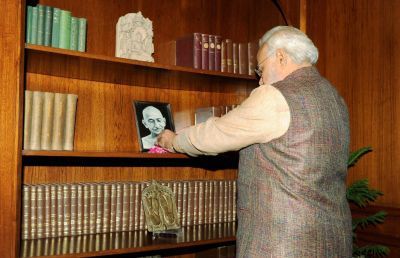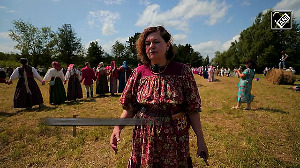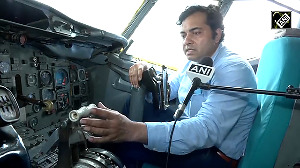 The prime minister is checking in with baggage of the kind that will make history, any which way things take a turn, says Sheela Bhatt/Rediff.com
The prime minister is checking in with baggage of the kind that will make history, any which way things take a turn, says Sheela Bhatt/Rediff.com
This weekend Prime Minister Narendra Modi will probably check into 7, Race Course Road, India's most coveted address (contrary to reports that he had moved into 7 RCR on Friday, Gujarat Bhavan, where he has been staying since his arrival in Delhi, confirmed that he hadn't moved out yet).
It is clear that from Gandhinagar that Modi has travelled light with his trademark kurtas and watches, leaving behind a legacy that his successor Anandiben Patel will find difficult to carry forward.
A handful of people who have seen Modi's chief ministerial office in Swarnim Sankul in Gujarat find the Prime Minister's Office in South Block quite dull.
One visitor who called on Prime Minister Modi said that by any criterion his Gandhinagar office was much more posh, modern and bright with abundant natural light. The Gandhinagar building is state of the art worth Rs 120 crore plus (Rs 1.2 billion plus) where before sunset then chief minister Modi never had to switch on the lights. In comparison, his South Block office is a classic Raj structure, with old fittings that are suitable to the old way of life.
Modi's staff members are aghast to know that in Dr Manmohan Singh's 10 years as prime minister, not many of his office staff knew him on a personal basis. Most of the junior staff had only seen him getting off his car or driving home.
Prime Minister Modi's office, on its third day in office, issued a statement that he took a round of the Prime Minister's Office, inquiring about the functioning of the sections and the facilities available for the staff.
Earlier, on May 26, just a few hours before his swearing-in, the prime minister-designate's office issued an important statement(external link), which was not drafted properly and had an informal touch, from Gujarat Bhavan. It gave a significant insight into Modi's rule to come. By making one Cabinet minister head a cluster of ministries, Modi has made bureaucrats very important.
Modi's weighty presence in South Block reminds New Delhi that this is the Modi moment. There is euphoria bordering on madness to praise him in his party. People who meet him are awestruck. The figure 282 -- the Bharatiya Janata Party's strength in the Lok Sabha -- is nothing but magical for Modi fans. At the same time, there are pensive faces too, because Modi raises curiosity and fear.
Within the first few hours of assuming office Modi conducted one-on-one talks with his Pakistan counterpart Nawaz Sharif but Foreign Secretary Sujatha Singh didn't share with the media that he had this significant meeting with Sharif. It suggests that Modi "does not want to convey possible readiness to engage without appearing to be doing a rapid about-turn after all the rhetoric of the last six months," says a retired diplomat and prominent television commentator on strategic affairs.
Also, in his first few hours in office Modi resorted to a short-cut of governance by using emergency powers. His office issued an ordinance to change the rules of the Telecom Regulatory Authority of India Act, 1997, to enable former TRAI chairman Nriprendra Misra's appointment as his principal secretary. It is legal, but was it right?
Under the rules, Misra, as a former TRAI chairman, could not have taken up the assignment even though he was fully fit for the job and enjoys credibility, but Modi showed that he is a man in a hurry. The Indian Express criticised the move saying, 'The episode frames a seeming impatience with legal requirements in a case that involves an individual rather than an urgent point of principle. It could have anyway been settled in the government's favour as soon as Parliament convenes.'
From Gandhinagar to 7, RCR, Modi is checking in with baggage of the kind that will make history, any which way things take a turn.
But Modi has been unable to leave behind his fears and insecurities that leaders of his stature invariably have. In all world capitals, from Moscow to Damascus to Johannesburg, politics is all about fears and deep insecurities. The 282 Lok Sabha seats don't make any difference to these fears.
Actually, the power base drives these ambitious, popular and powerful rulers. From Vladimir Putin to Modi the story is the same. So, notwithstanding his collection of kurtas and watches that he has brought from Gandhinagar, in a way Modi has arrived in New Delhi to start a new chapter in Indian history with heavy check-in baggage.
A careful look at the composition of Modi's Cabinet gives us the first glimpse of his mindset. His criteria are clear. One, there is nobody who should overshadow his standing even behind closed doors. Modi is supreme. This will make things work, actually.
In the previous regime there was Pranab Mukherjee, P Chidambaram and A K Antony, and all were their own bosses. In the drastic change, Modi's message will percolate down to set standards for governance.
Smriti Irani, Piyush Goel or Nirmala Sitharaman's choice is actually the 'Ramanlal Vora syndrome' at work, which worked successfully in the politics of Gandhinagar. When Vora was appointed education minister by Modi, everyone asked 'Who Vora? Why Vora?' Modi picked Vora because he was excellent in executing ideas, plans and orders sent by Modi's office.
Modi's young ministers are not just smart, but intelligent too. They are totally clued in to Modi's game-plan to govern India. So, Modi has selected people like Prakash Javadekar and Nirmala Sitharaman who are not members of either House of Parliament, but who can work as hard as Modi does and as much as Modi wants.
It is very clear that any possible emergence of centres of power will be countered well by the Vora syndrome. In the current scheme of things, besides Modi who else could form a centre of power can't be judged because Amit Shah, the man credited for Modi's awesome success, hasn't been awarded anything yet.
Arun Jaitley and Shah's role in the formation of the Cabinet and their coordination with the Rashtriya Swayamsevak Sangh suggests that Modi has shown flexibility too. Rajnath Singh's supporters in the BJP regret that in spite of him being the clear number two in the Cabinet, it is Jaitley who is likely to emerge as a force to reckon with after Modi inside the Cabinet.
Again, at this momentous time when a transfer of power has taken place, it is noteworthy that Modi is not taking his strong position for granted even for a moment. Extending a hand of friendship to Tamil Nadu Chief Minister J Jayalalithaa is a masterstroke. If the Congress teams up with Mamata Banerjee, Jayalalitha and Naveen Patanik on the floor of the House then they can be a force to reckon with in spite of the National Democratic Alliance's strong presence with 336 seats.
A senior diplomat who has seen Modi working furiously in the last few days says, "It seems the Modi government is working to fulfill the promises given to the people. They look determined to honour the mandate. But I have a lurking fear that after a few months the Modi government will give us the feeling that we get as we arrive in Tehran, Beijing and Moscow. All three cities are great. There is prosperity, but as an Indian you never like it. You feel something is amiss."
"Back home you enjoy too much democracy. In that picture-perfect urban skyline of Beijing you miss your own say, the argumentative culture," the diplomat adds.
It may be premature to say if the Modi government will eventually emit such a feeling.
Modi is far more intelligent and has a proven track record of understanding the voters' psyche, so he is likely to stick to their mandate to change the basics of governance for the good of the people.
The first week of Modi's government very much resembles Gandhinagar's power politics. Over there, Modi used to pick and choose ideas. The core team, not necessarily political, would mull over it. Modi then gave his final stamp and he, alone, would pick the political hands to implement it.
Things worked for Modi in Gandhinagar.
Prime Minister Modi's first week in office raises hopes that things may work well for him again.
Image: Prime Minister Narendra Modi in his office in South Block, New Delhi. Photograph: PTI Photo.











